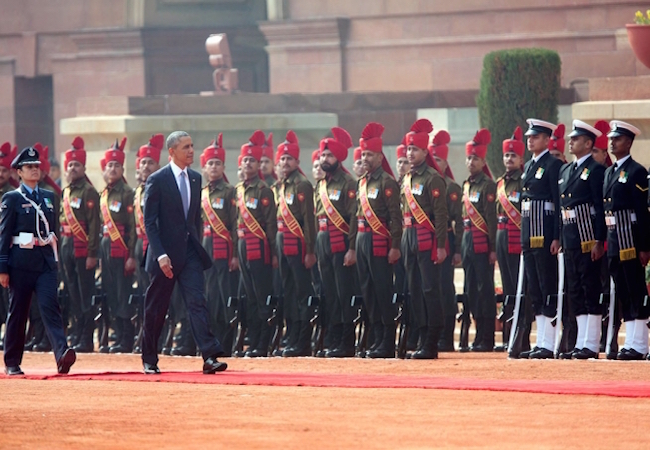
By Adeel Mukhtar
Since its inception, the Indo-U.S strategic partnership has been significant as well as contentious subject of academic debates among international strategic community. The most significant part of this strategic partnership is, of course, Indo-US nuclear deal among other parts of the partnership like joint military exercises, transfer of technology and military cooperation etc. The severity of this partnership can be comprehended based on its diverse international and regional effects.
Internationally, Indo-U.S nuclear deal aggravated non-proliferation fears of the strategic community. In other words, the deal has not only, “damaged the global non-proliferation regime and exacerbated the nuclear tensions in South Asia”[1] but also, “undermined attempts to prevent states like Iran and North Korea from acquiring nuclear weapons and potentially contributes to a nuclear arms race in Asia.”[2] There is also not any sound framework to limit India’s nuclear weapons program through this deal as, according to Henry Sokolski of the Non-Proliferation Policy Education Centre, “We are going to be sending, or allowing others to send, fresh fuel to India including yellowcake and lightly enriched uranium that will free up Indian domestic sources of fuel to be solely dedicated to making many more bombs than they would otherwise have been able to make.” From the Pakistani side, while explicating the global nuclear order, Dr. Zafar Nawaz Jaspal writes that the global nuclear order is based on the United States Atomic Energy Act 1954, Non-Proliferation Treaty, the International Atomic Energy Agency and the Nuclear Suppliers Group.[3] Hence, keeping in view of Dr. Jaspal’s point of view and the introduction of country-specific amendments in the foundations of non-proliferation regime has caused virtually a deathblow to the international non-proliferation efforts.
At the regional level, Indo-U.S strategic partnership is bound to disturb the strategic equilibrium in South Asia. Owing to the detrimental effects of this deal to the regional security architecture, Pakistan expressed serious reservations on this agreement on several platforms. Shedding light on the regional implications of the nuclear deal on the security of Pakistan, Dr. Adil Sultan writes, “the Indo-US civil nuclear cooperation agreement if implemented without checking India’s potential to increase its fissile stocks and eliminating any possibility by India of improving its nuclear weapons could lead to arms competition in the region involving Pakistan, India and China, thus destabilizing the entire region.” The track record of India is also questionable as the establishment of Nuclear Suppliers Group (NSG) was because of India’s 1974 nuclear test which was her intentional diversion of “Atom for Peace” program to the development of nuclear weapons. This is why the National Command Authority (NCA) showed her concerns by stating, “U.S-India Civil Nuclear Deal, which would enable India to produce significant quantities of fissile material and nuclear weapons from unsafeguarded nuclear reactors, may ignite an arms race and have implications on the strategic stability in South Asia.”[4] Similarly, Indo-U.S Civil Nuclear Deal would prove a boost in the quantitative as well qualitative development of its nuclear program, which includes installation of Anti-Ballistic Missile system, buildup of nuclear arsenals, delivery systems and Cold Start Doctrine coupled with India’s continuously increasing defence budget and conventional military might. Therefore, Indo-U.S nuclear deal is bound to threaten the national security of Pakistan. The advancement in the deal is no doubt would shift the geo-strategic environment of Asia Pacific into unstable one.
References
- Hibbs, Mark. “Moving Forward on the U.S.-India Nuclear Deal.” Carnegie Endowment for International Peace, April 5, 2010. http://www.carnegieendowment.org/2010/04/05/moving-forward-on-u.s.-india-nuclear-deal/25yl. (accessed April 11, 2015).
- Jayshree Bajoria and Esther Pan, “The U.S.-India Nuclear Deal.” Council on Foreign Relation, November 5, 2010, http://www.cfr.org/india/us-india-nuclear-deal/p9663. (accessed April 12, 2015).
- Zafar Nawaz Jaspal, “Indo-US deal: Altering Global Nuclear Order.” Islamabad Strategic Studies Institute, 2008, http://www.issi.org.pk/old-site/ss_Detail.php?dataId=480.
- IPCS News Archives.” Institute of Peace and Conflict Studies. August 4, 2007. http://www.ipcs.org/pdf_file/news_archive/aug_07_indiaexternal.pdf.(accessed April 12, 2015).




